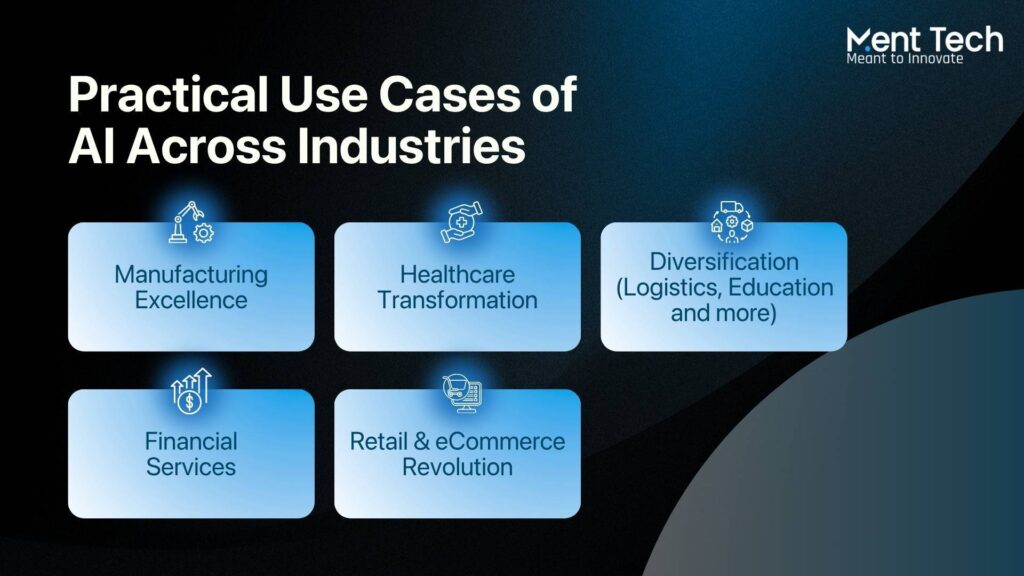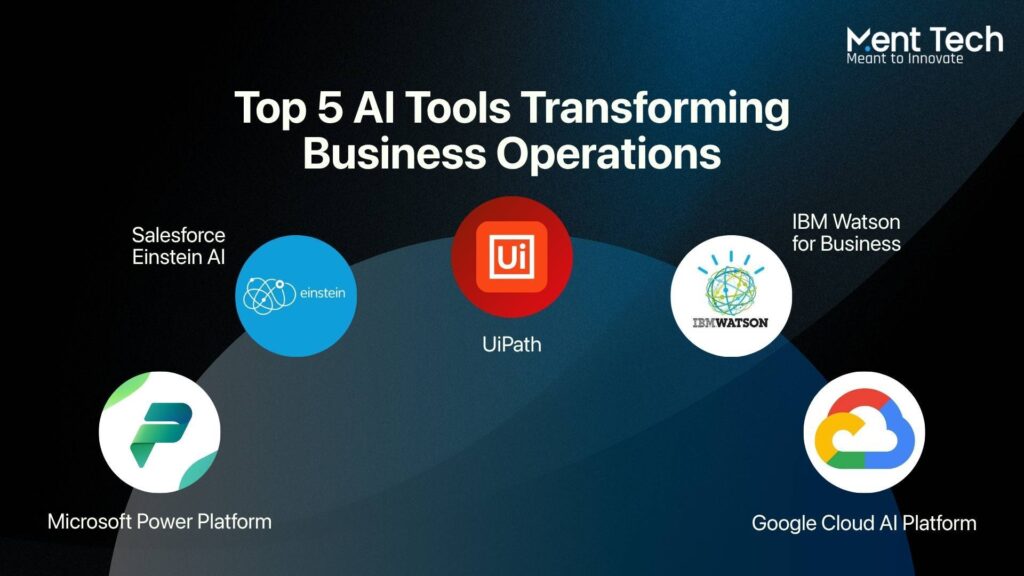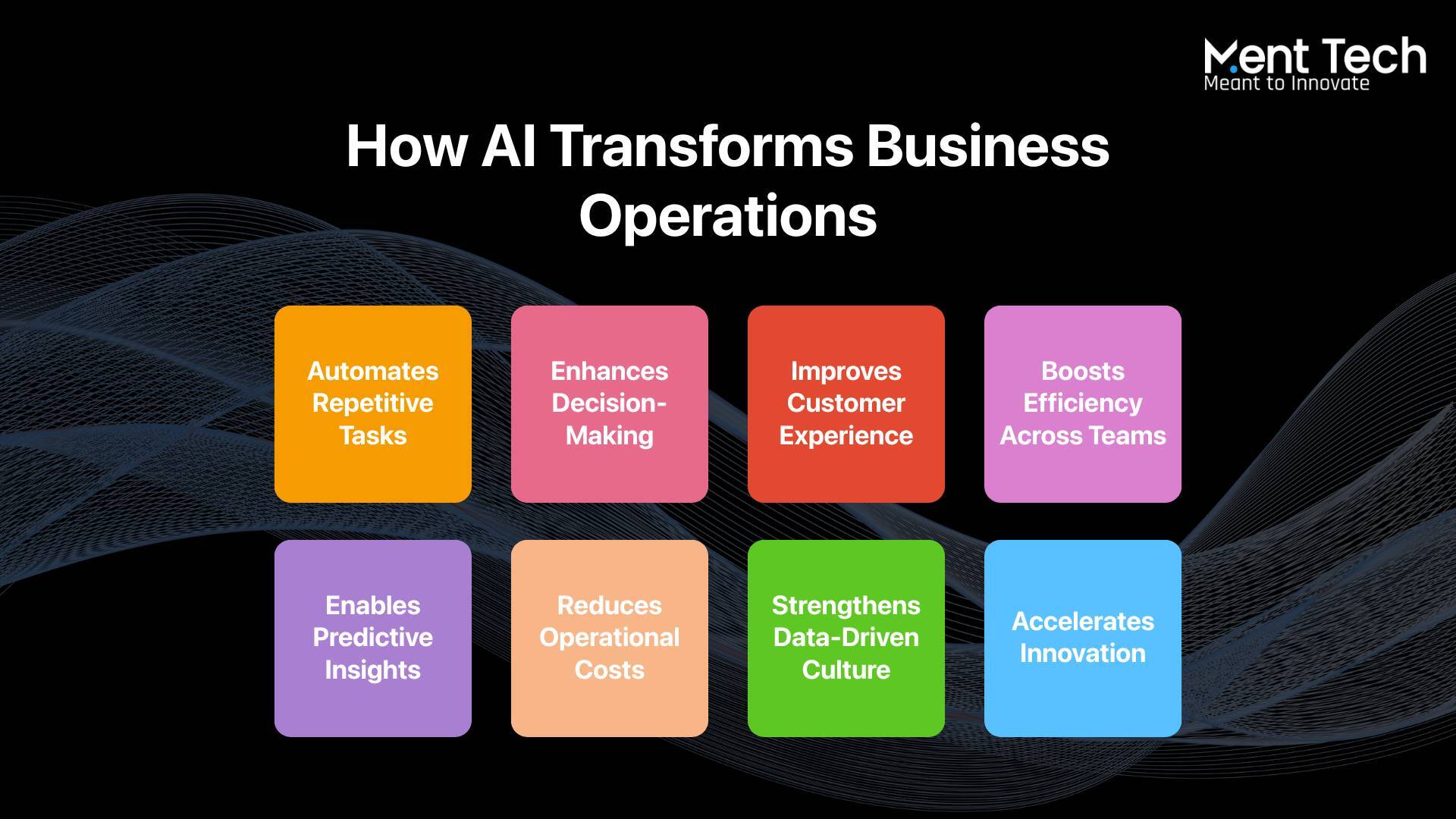The business world evolves rapidly, and artificial intelligence has emerged as the most powerful force driving this evolution. In October 2025, over 78% of companies have adopted AI for at least one business function, with many integrating AI in business operations across multiple areas to boost performance and efficiency. This evolution from experimental technology to essential business infrastructure represents one of the most important changes in modern enterprise history.
The secret to successful transformation lies not in individual AI tools, but in comprehensive AI Platforms in Business Operations that unify multiple capabilities under one roof. Early adopters have discovered that around 89% of small businesses are using AI tools to automate tasks and improve productivity, leading to ongoing increased investment, especially in Generative AI. The message is clear: businesses that fail to embrace AI platforms now risk being left behind in an increasingly automated and intelligent marketplace.
Why AI Platforms Are Essential for Modern Businesses?
The business case for AI integration in business operations extends far beyond simple automation. Modern AI platforms address fundamental challenges that every growing business faces, delivering benefits that compound over time.
1. Efficiency and Productivity Revolution
AI platforms excel at eliminating bottlenecks and streamlining complex workflows. Unlike traditional automation that follows rigid rules, AI can handle exceptions, make intelligent decisions, and adapt to changing circumstances. This means your team can focus on strategic work while AI handles routine tasks and even complex decision-making processes that previously required human intervention.
2. Enhanced Scalability Without Proportional Costs
One of the most compelling benefits of AI in business operations is scalability. As your business grows, AI platforms can handle increased data volumes, serve more customers, and manage more complex operations without requiring proportional increases in staff. This scalability advantage becomes particularly important during peak seasons, expansion phases, or when entering new markets.
3. Data-Driven Decision Making
AI platforms transform how businesses use data. Instead of generating reports that humans must interpret, AI platforms provide actionable insights, predict future trends, and even recommend specific actions. This creates a single source of truth across your organization and enables faster, more accurate decision-making at all levels.
4. Sustainable Competitive Advantage
Perhaps most importantly, AI platforms enable continuous innovation and improvement. They help businesses anticipate market changes, understand customer needs more deeply, and respond to opportunities faster than competitors. Companies using comprehensive AI platforms report improved customer satisfaction, faster product development cycles, and the ability to identify new revenue opportunities that would otherwise remain hidden.
How AI Platforms Work?
AI platforms function as unified ecosystems that bring together multiple artificial intelligence technologies under one integrated system. Instead of relying on separate tools for tasks like data analysis, chatbots, or automation, AI platforms combine these functions in a single environment. Businesses adopting AI platforms for business growth can streamline operations, improve efficiency, and gain actionable insights across all departments.
A typical AI platform includes:
- Data Processing & Analytics: Handles large amounts of structured and unstructured data, cleaning, organizing, and preparing it for analysis.
- Machine Learning Models: Pre-built or customizable algorithms that learn from data and make predictions or recommendations.
- Natural Language Processing (NLP): Understands human language, enabling chatbots, document analysis, and voice recognition.
- Robotic Process Automation (RPA): Automates repetitive tasks traditionally performed by humans.
- APIs & Integration Layers: Connects the AI platform seamlessly with existing business systems.
- Centralized Management: Provides one interface to control all AI functions efficiently.
- Scalability: Grows with business needs without requiring proportional increases in staff or infrastructure.
- Avoids Data Silos: Ensures smooth data flow between functions and departments.
- Intelligent Insights: Generates actionable insights by analyzing integrated data across the platform.
- Continuous Learning: Improves over time as the system processes more data and adapts to AI in business operations.
Key Ways in which AI Platforms Transforming Business Operations
This section highlights the key ways AI platforms are transforming business operations. By automating tasks, enhancing decision-making, improving customer experiences, and driving innovation, AI enables businesses to operate more efficiently, strategically, and competitively.
1. Automating Repetitive and Complex Tasks
The most immediate impact of implementing AI in business operations comes through automation, but modern AI goes far beyond simple task automation. Robotic Process Automation handles routine tasks like data entry, invoice processing, report generation, and document management with near-perfect accuracy and 24/7 availability.
2. Enhancing Decision-Making and Insights
AI platforms excel at turning data into actionable insights. Predictive analytics capabilities can forecast sales trends, predict equipment failures, identify customer churn risks, and optimize inventory levels. These predictions aren’t just interesting statistics – they enable proactive business decisions that prevent problems and capitalize on opportunities.
3. Improving Customer Experience
Modern customers expect personalized, immediate, and seamless experiences. AI platforms deliver this through sophisticated recommendation engines, intelligent chatbots, and virtual assistants that understand context and customer history. These systems can anticipate customer needs, suggest relevant products or services, and resolve issues quickly.
4. Optimizing Supply Chain and Operations
Supply chain optimization represents one of the most impactful applications of AI in business. AI platforms can predict demand fluctuations, optimize inventory levels, identify the most efficient shipping routes, and even predict and prevent equipment failures before they occur.
5. Driving Innovation and New Business Models
Perhaps the most exciting aspect of AI platforms is their ability to enable entirely new ways of doing business. AI enables experimentation with new products, services, and processes at unprecedented speed and scale. Companies are discovering new revenue streams, developing innovative customer services, and creating smarter market strategies through AI-driven insights.
Practical Use Cases of AI Across Industries

Understanding how different industries are successfully integrating AI in business operations provides valuable insights for implementation strategies. Here are proven applications across major sectors:
1. Manufacturing Excellence
Manufacturing companies are using AI for predictive maintenance, quality control, and operational efficiency. AI systems monitor equipment performance in real-time, predict failures before they occur, and optimize production schedules based on demand forecasts. Quality control systems use computer vision to detect defects faster and more accurately than human inspectors.
2. Healthcare Transformation
Healthcare organizations leverage AI for diagnostic assistance, patient monitoring, and treatment personalization. AI systems can analyze medical images, predict patient deterioration, and recommend treatment protocols based on patient history and current research. Administrative processes like appointment scheduling and insurance verification are increasingly automated.
3. Financial Services Innovation
Financial institutions use AI for fraud detection, risk assessment, and algorithmic trading. AI systems can identify suspicious transactions in real-time, assess credit risks more accurately than traditional methods, and execute trades based on market analysis. Customer service is enhanced through intelligent chatbots that can handle complex financial queries.
4. Retail and eCommerce Revolution
Retail companies excel at using AI for personalized marketing, inventory optimization, and demand forecasting. AI systems analyze customer behavior to recommend products, optimize pricing strategies, and predict seasonal demand patterns. Supply chain optimization ensures products are available when and where customers want them.
5. Additional Sector Applications
Logistics companies optimize delivery routes and warehouse operations. Educational institutions personalize learning experiences and automate administrative tasks. Smart city initiatives use AI for traffic management, energy optimization, and public safety. Enterprise services leverage AI for document processing, contract analysis, and customer relationship management.
Top 5 AI Tools for Transforming Business Operations

To illustrate the practical impact of AI in business operations examples, let’s examine five leading AI tools that are currently transforming how businesses operate across different functions. These platforms demonstrate the real-world application of AI concepts discussed throughout this guide.
1. Microsoft Power Platform with AI Builder
Microsoft’s Power Platform integrates AI capabilities directly into business workflows through Power Automate, Power Apps, and Power BI. The AI Builder component enables businesses to add intelligence to their processes without requiring coding expertise. Companies use it for document processing, sentiment analysis, and predictive analytics, making it an excellent example of using AI in business operations at scale.
2. Salesforce Einstein AI
Salesforce Einstein brings AI directly into customer relationship management, demonstrating powerful AI use cases in business operations focused on sales and customer service. The platform provides predictive lead scoring, automated email responses, and intelligent customer service routing.
3. UiPath AI-Powered Automation
UiPath represents the evolution of robotic process automation into intelligent automation. Beyond simple task automation, UiPath incorporates machine learning and natural language processing to handle complex business processes that require decision-making capabilities.
4. IBM Watson for Business
IBM Watson offers enterprise-grade AI capabilities across multiple business functions, from customer service chatbots to supply chain optimization. Watson’s strength lies in its ability to process unstructured data, understand natural language, and provide insights that support complex business decisions.
5. Google Cloud AI Platform
Google Cloud AI Platform provides comprehensive machine learning and AI services that businesses can integrate into their existing applications and workflows. The platform offers pre-trained models for common business tasks as well as tools for developing custom AI solutions.
Challenges and Considerations
While using ai in business operations offers tremendous benefits, organizations must navigate several important challenges:
| Challenge Category | Specific Issues | Impact on Business |
| Data Quality & Integration | Poor data quality, scattered data sources, integration complexity | Inaccurate AI predictions, delayed implementation, higher costs |
| Talent & Skills | AI expertise shortage, training requirements, change management | Slow adoption, suboptimal results, employee resistance |
| Ethical & Compliance | Algorithm bias, privacy concerns, regulatory compliance | Legal risks, reputation damage, regulatory penalties |
| Financial Investment | High upfront costs, unclear ROI timeline, ongoing expenses | Budget strain, difficulty justifying investment, resource allocation |
| Technical Infrastructure | Legacy system compatibility, scalability issues, security vulnerabilities | System failures, performance bottlenecks, cyber security risks |
| Organizational Readiness | Cultural resistance, unclear AI strategy, lack of executive support | Failed implementations, wasted resources, competitive disadvantage |
| Performance Monitoring | Measuring AI effectiveness, maintaining model accuracy, continuous optimization | Declining performance, unreliable results, missed opportunities |
Essential Practices for AI Implementation in Modern Businesses
Successful AI integration in business operations follows proven methodologies that minimize risk while maximizing benefits. These best practices are derived from successful implementations across various industries and company sizes.
1. Strategic Process Identification
Begin by identifying business processes where AI can deliver the most immediate and measurable value. Focus on areas with high volume, repetitive tasks, or complex decision-making that could benefit from data-driven insights. Start with processes that have clean, accessible data and clear success metrics.
Consider partnering with experienced providers who offer AI as a service solutions to accelerate implementation and reduce initial complexity. This approach allows organizations to benefit from AI capabilities without requiring extensive internal expertise from day one.
2. Platform Selection and Scalability
Choose AI platforms that can grow with your business rather than point solutions that solve only immediate problems. Look for platforms that offer easy integration with existing systems, comprehensive AI agent development capabilities, and the flexibility to adapt to changing business needs.
Evaluate platforms based on their ability to handle your current data volumes and processing needs while providing room for growth. Consider factors like security, compliance features, and the vendor’s track record in your industry.
3. Human-AI Collaboration
The most successful AI implementations focus on augmenting human capabilities rather than replacing people entirely. Design workflows that leverage AI for data processing and initial analysis while keeping humans involved in strategic decisions, creative problem-solving, and relationship management.
Invest in training programs that help employees work effectively with AI systems. This includes understanding AI capabilities and limitations, interpreting AI-generated insights, and maintaining oversight of automated processes.
4. Continuous Improvement and Monitoring
AI systems require ongoing monitoring and refinement to maintain effectiveness. Establish metrics for measuring AI performance, regularly review and update AI models based on new data, and continuously look for opportunities to expand AI applications to new areas of your business.
Consider working with an AI agent builder or development partner who can help customize and optimize AI solutions for your specific business needs. This ongoing partnership ensures that your AI capabilities evolve with your business requirements.

Future Outlook of AI Platforms in Business Operations
The trajectory of AI in business operations points toward even more transformative changes in the coming years. AI platforms are rapidly becoming the backbone of digital transformation initiatives, enabling businesses to adapt quickly to market changes and customer demands.
1. The Rise of Agentic AI
The future includes more autonomous AI systems that can make complex decisions, learn from outcomes, and adapt their behavior accordingly. Agentic AI in business operations will enable systems that can manage entire business processes with minimal human oversight while maintaining the ability to escalate complex situations to human decision-makers.
Organizations that implement agentic AI early will gain significant advantages in operational efficiency and responsiveness. These systems will handle everything from customer service interactions to supply chain optimization, making decisions based on real-time data and predefined business objectives.
2. Generative AI Integration
The rapid advancement of generative AI technologies is creating new possibilities for content creation, code development, and creative problem-solving. Generative AI development is enabling businesses to automate tasks that were previously considered uniquely human, such as writing, design, and strategic planning. To maintain originality in such AI-assisted content, tools like AI plagiarism remover help ensure the final output remains unique and compliant.
3. Adaptive Business Workflows
Future AI platforms will create truly adaptive business workflows that can reconfigure themselves based on changing conditions, seasonal patterns, or market dynamics. This level of adaptability will enable businesses to maintain optimal performance even in rapidly changing environments.
The long-term strategic advantages include increased business agility, continuous innovation capabilities, and sustainable competitive advantages that are difficult for competitors to replicate. Organizations that embrace comprehensive AI platforms now will be best positioned to benefit from these future developments.
Conclusion
AI platforms are transforming the way businesses operate by making processes faster, smarter, and more efficient. They help companies improve decision-making, deliver better customer experiences, and stay competitive in an ever-changing market. By automating repetitive tasks and turning data into useful insights, businesses can save time, cut costs, and focus more on innovation and growth. Embracing AI platforms allows companies to work smarter and build a stronger foundation for the future.
At Ment Tech, we help businesses build and use powerful AI solutions that fit their goals. Our expert AI developers can create tools that automate work, boost performance, and drive growth. Get in touch with Ment Tech today to hire skilled AI developers and grow your business.
FAQs
AI tools typically solve specific, isolated problems like chatbots or data analysis. AI platforms in business operations are comprehensive systems that integrate multiple AI capabilities (machine learning, automation, analytics) into one unified solution.
Most businesses see initial returns within 6-12 months when using AI in business operations for automation and efficiency improvements. However, the timeline varies based on implementation complexity and use cases.
The primary challenges include data quality and integration issues (60% of projects), talent and skills gaps (45% of organizations), and unclear ROI expectations (40% of implementations).
Small businesses can absolutely benefit from AI platforms. In fact, 89% of small businesses are already using AI tools to improve productivity. Modern AI as a service solutions make enterprise-grade AI accessible to smaller organizations without massive upfront investments.
Start with high-volume, repetitive processes that have clear success metrics and clean data. Common starting points include customer service automation, invoice processing, inventory management, and sales lead scoring.
Establish clear AI governance policies that address bias prevention, data privacy, and decision transparency. Implement regular audits of AI decision-making processes, ensure diverse training data, and maintain human oversight for critical decisions.
Employees need a combination of technical literacy and business acumen. Key skills include understanding AI capabilities and limitations, data interpretation, process optimization, and change management.


